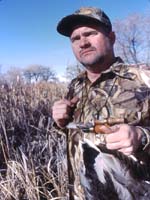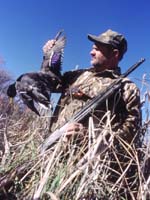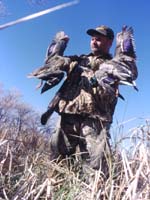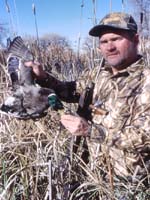
|
Features
|
|
|
|
Books
|
|
|
|
Fun & Games
|
|
|
|
Contact Us
|
|
|
John's Journal... Entry 73, Day 1
General Duck-Hunting Information
 EDITOR'S
NOTE: Brad Harris, vice president of public relations at Outland Sports,
the owners of Lohman and M.A.D. calls, is a hunting expert and a longtime
duck hunter. More than 26-million households across the nation watch Outland
Sports television show, "Outdoor Traditions with Brad Harris."
EDITOR'S
NOTE: Brad Harris, vice president of public relations at Outland Sports,
the owners of Lohman and M.A.D. calls, is a hunting expert and a longtime
duck hunter. More than 26-million households across the nation watch Outland
Sports television show, "Outdoor Traditions with Brad Harris."
Question: How long have you been hunting ducks,
Brad?
Answer: I've been hunting ducks off and on for probably 25 years.
Question: When most people think of duck hunting,
they think of big-water ducks. But I know you like to hunt pothole ducks,
so tell me how you do that.
Answer: Scouting is the biggest part of successfully hunting pothole
ducks. While I'm out deer, coyote, rabbit hunting or whatever I'm doing
other than duck hunting, I keep my eyes open for the opportunity to hunt
pothole ducks. I locate little areas where ducks have found sanctuaries
such as little marshes and flooded places, which make for great action.
Scouting gives me an idea of where these ducks are using these small marshy
regions, and then I go back and set up and have a great hunt.
 Question:
You hunt farm pond ducks, too, which are ducks that drop into farm ponds
in the wintertime in different parts of the country. The ducks may be
there one day and gone the next. How do you set up, how do you hunt them,
and how many times can you get these ducks to come back?
Question:
You hunt farm pond ducks, too, which are ducks that drop into farm ponds
in the wintertime in different parts of the country. The ducks may be
there one day and gone the next. How do you set up, how do you hunt them,
and how many times can you get these ducks to come back?
Answer: We have a lot of farm ponds in Kansas in the areas that
I deer hunt. While I'm deer hunting, I may see ducks resting where they've
found a sanctuary for several days. When I spot that, I usually check
on the wind and look for the best place to set up. Hunting farm-pond ducks
is almost like a poor boy's way of hunting. I don't carry a blind or anything.
I just use what's natural around the banks. I take half a dozen Feather
Flex decoys with me because they're so lightweight I can carry them in
my coat pocket and toss them out. You're generally going to get one flight
and one shoot. The key is locating several of those ponds, so that throughout
the day you may get in half a dozen shoots.
Question: So you just go from pond to pond and
don't try to call them back?
Answer: In areas where I know the ducks are in small groups that
are using individual ponds, I won't stay. I make that one shoot and move
on. Now if it's a pond or an area along a river or some place that's getting
a constant flight of ducks, I can set up and spend quite a bit of time
and maybe get several flights in before the day is over.
 Question:
On those small shoots, do you depend on calling at all, or do you depend
strictly on your decoys?
Question:
On those small shoots, do you depend on calling at all, or do you depend
strictly on your decoys?
Answer: Actually when I hunt ducks, I do many different things.
No. 1, I'm there because the ducks want to come to that site, so that's
the biggest plus. The decoys fool the ducks' eyes and give them the security
that ducks are already there. The decoys help them land in a tighter area
where hopefully you've set them in close, where you have good shooting
range. Then you incorporate the calls to give you the vocal sound. So
you have the visual, the vocal and the scouting. By knowing the ducks
have been going to that area, utilizing the wind as well, realizing which
way they're going to bank and come in to the decoys and things like that
are equally as important as when you're hunting ducks anywhere else.
Question: Brad, how does someone learn to call
a duck?
Answer: That's something that takes some practice, and there are
several ways to do that. You can learn from an accomplished duck caller.
You'd be surprised by how you can sit with someone for an hour and watch
him and listen to him and get his techniques down to learn to become a
duck caller that way. Many good instructional videos and cassette tapes
can help you get started on calling ducks and give you the right pointers.
The bottom line is making up your mind that you're going to be a duck
caller. Start by learning the basics -- single quacks, the basic five
quacks and the basic feeding sounds, and you'll do real well if you're
hunting where ducks want to go.
 Question:
What's the name of your video about duck hunting?
Question:
What's the name of your video about duck hunting?
Answer: "Waterfowl Challenge" is a combination
duck-goose video that has a lot of good calling tips and instructional
segments on it. It also features some really good hunts and tips on how
set up blinds and things like that. You can get it through Bass Pro Shop
or Cabela's, or you can order direct from Allen Sports by calling (800)
922-9034.
Tomorrow: Acrylic vs. Wood Duck Calls
Check back each day this week for more about Brad Harris On Duck Hunting ...
Day 1 -General Duck-Hunting
Information
Day 2 -Acrylic vs. Wood Duck Calls
Day 3 -When to Use Different Types of Duck
Calls
Day 4 -Reading the Ducks
Day 5 -Hunting Ducks in High-Pressure Areas